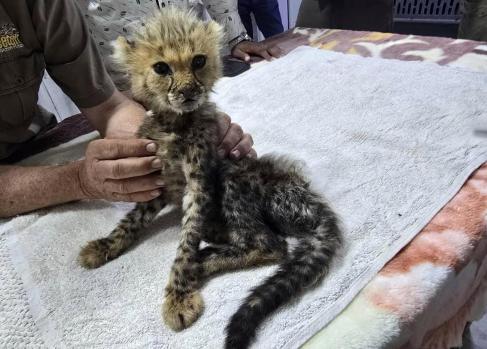Written by EVELYNE MUSAMBI
Kenya’s NAIROBI (AP) In Somaliland, a breakaway part of Somalia, ten cheetah cubs that had been kept in captivity since birth and were headed for international wildlife trade markets have been saved.
Related Articles
-
US sanctions more ICC judges, prosecutors for probes into alleged American, Israeli war crimes
-
Kim s sister says North Korea will never see the South as a diplomatic partner
-
Poland calls a drone crash in the country s east a Russian provocation amid peace talks
-
NATO defense chiefs hold candid discussion on security guarantees for Ukraine
-
Israel to mobilize 60,000 reservists ahead of an expanded Gaza City operation
Despite being undernourished and hobbling from being chained in prison for months, Laurie Marker, the founder of the Cheetah Conservation Fund (CCF), which is caring for the cubs, stated on Wednesday that all of them were in stable condition.
She said that a 5-month-old cub was severely emaciated (a bag of bones), had sores all over her body, and was covered in botfly maggots under her skin, while an 8-month-old cub was unable to move after being restrained for six months.
However, because of refeeding syndrome, which is identical to what happens to people who are starving, we must gradually introduce food to cubs like this, she continued.
During an operation in the northern Sallahley District on August 14, two individuals found in possession of the cubs were taken into custody. The public has been asked to report suspicious wildlife trade activities by the government.
According to Abdinasir Hussein Said, director of the environment ministry, the cheetah kittens have joined 109 others who were saved in earlier operations.
One of the main transit hubs for the illegal wildlife trade is Somaliland. The Gulf of Aden has been used to move hundreds of cheetahs and leopards from the Horn of Africa to Gulf nations.
In Somaliland, it is against the law to own wildlife, and suspected traders are frequently targeted by the police.
Because it is in their best interests, we urge the people of Somaliland to preserve wildlife in its native settings, Hussein said. We can appreciate how upsetting it must be for a mother to be separated from her children.
Because of their separation from their moms, these animals are currently suffering, which could cause stress and even death for the mothers. We stress the significance of preserving animals in their natural settings once more.
The increase in demand for exotic pets in Gulf countries and the ensuing illegal trade that impacts ecosystems in Horn of Africa countries have previously alarmed conservationists in the region.
This report was written by Mohamed Sheikh Nor, an Associated Press correspondent from Mogadishu, Somalia.
















